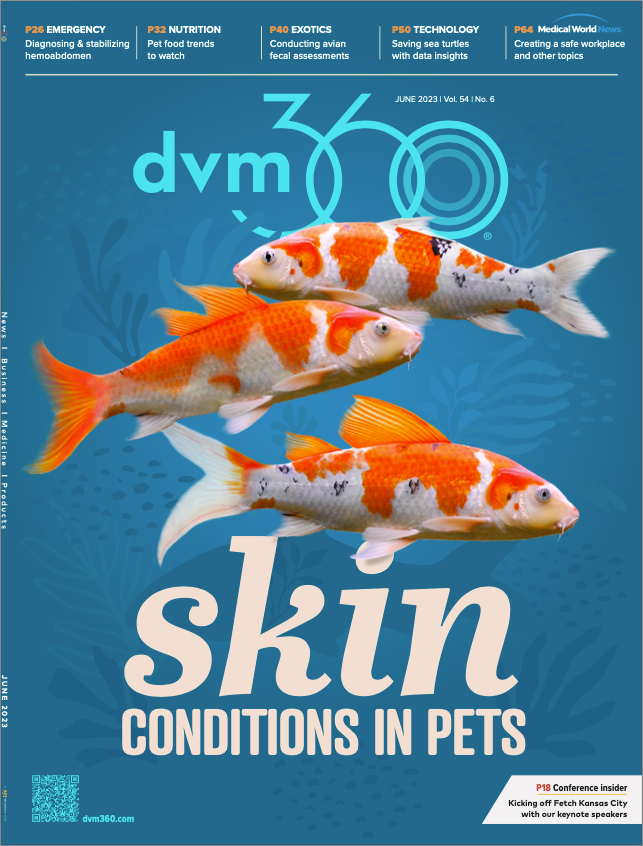The impact of new guidance on compounding animal drugs
The FDA’s recent publication addresses quality control, sterility testing, labeling and other topics relevant to veterinary medications
Photo: Kzenon/Adobe Stock

Compounded drugs are widely used in veterinary medicine due to the large spectrum of therapeutic needs and the relatively small number of approved pharmaceuticals for all animal species and indications.1 Compounded drugs can provide therapy to animals when no suitable FDA-approved products are available. Additionally, the use of flavoring or a novel route of administration can increase uptake and adherence in patients, particularly in animals that are difficult to medicate.
Veterinary professionals became familiar with the FDA Center for Veterinary Medicine’s Updated Guidance for Industry (GFI) #256: Compounding Animal Drug from Bulk Drug Substances document during an education session at the 2023 Fetch dvm360® Conference in Charlotte, North Carolina, presented by Ernie Ward, DVM, CVFT, veterinary medical lead for Basepaws. “The FDA acknowledges that veterinarians need to turn to compounded medications,” said Marcy A. Bliss, CEO of Wedgewood Pharmacy, which sponsored the session.2
GFI #256 provides guidance for veterinary drug-compounding facilities that use bulk drug substances to compound drugs for animal use. The guidance, which took effect on April 1, 2023, covers various topics related to drug compounding, including quality control, sterility testing, labeling, record-keeping, and reporting adverse events.3 “What the FDA is trying to accomplish [with the updated guidance] is to ensure that veterinarians use FDA-approved medications when it is applicable to their patient,” Bliss said.2
Three elements of GFI #256 that veterinarians need to be aware of include dynamic lists, medical rationale, and adverse event reporting. The guidance requires all compounded office stock medications for emergency use to be compounded from materials on the FDA-approved list of bulk drug substances. Although medications that are not on the approved list may still be prescribed for patients, these drugs cannot be ordered for in-office use. Furthermore, a medical rationale, in addition to a patient-specific prescription, will be required for medications compounded from active pharmaceutical ingredients not on the FDA's list of bulk drug substances and that are considered copies of a commercially available product, specifically those of the same drug, dose, and route of administration.
The requirement to use FDA-approved medications in office-use compounded drug “could potentially delay the delivery of some medications. [Delivering medications] may be a process of waiting to call it in and prescribe it. Be aware that there’s been such an impact here,” said Ward.
Given that poor compounding practices can lead to bacterial or fungal contamination, the FDA is concerned about widespread harm if office stock medications are compounded in unsanitary conditions, according to Ward. Veterinarians are now required to report adverse events to the FDA via Form 1932a, which can be downloaded and mailed to the FDA.
Since the guidance is intended to ensure that animal drugs compounded from bulk dug substances are safe and effective, and meet the needs of patients, the FDA is seeking veterinarians’ input regarding which drugs compounded from its bulk drug substances lists are necessary for office use. Bliss and Ward urged veterinarians to take advantage of the opportunity to provide comments. "This is a collective effort,” Ward emphasized.
References
- Davidson G. Veterinary compounding: Regulation, challenges, and resources. Pharmaceutics. 2017;9(1). doi:10.3390/pharmaceutics9010005
- Ward E. The Real Impacts of GFI256 on Veterinary Practices. Presented at: Fetch dvm360 conference; Charlotte, NC. March 24-26, 2023.
- Q&A: GFI #256 - Compounding Animal Drugs from Bulk Drug Substances. FDA. Updated March 10, 2023. Accessed April 20, 2023. https://www.fda.gov/animal-veterinary/animal-drug-compounding/qa-gfi-256-compounding-animal-drugs-bulk-drug-substances#GFI256
